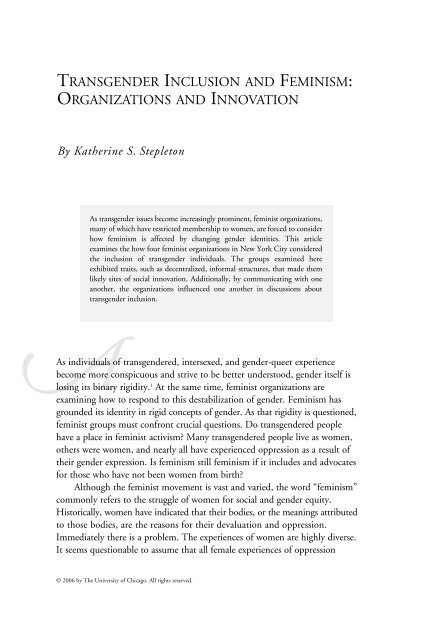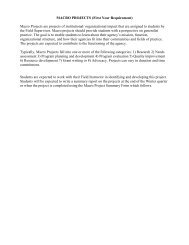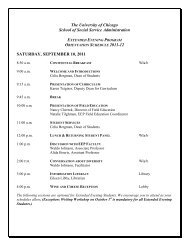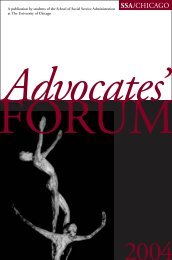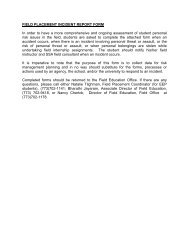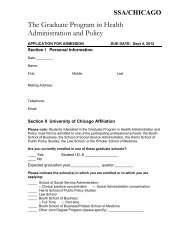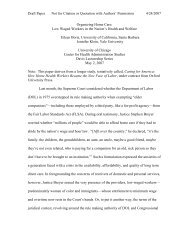2006 - School of Social Service Administration - University of Chicago
2006 - School of Social Service Administration - University of Chicago
2006 - School of Social Service Administration - University of Chicago
You also want an ePaper? Increase the reach of your titles
YUMPU automatically turns print PDFs into web optimized ePapers that Google loves.
TRANSGENDER INCLUSION AND FEMINISM:<br />
ORGANIZATIONS AND INNOVATION<br />
By Katherine S. Stepleton<br />
As transgender issues become increasingly prominent, feminist organizations,<br />
many <strong>of</strong> which have restricted membership to women, are forced to consider<br />
how feminism is affected by changing gender identities. This article<br />
examines the how four feminist organizations in New York City considered<br />
the inclusion <strong>of</strong> transgender individuals. The groups examined here<br />
exhibited traits, such as decentralized, informal structures, that made them<br />
likely sites <strong>of</strong> social innovation. Additionally, by communicating with one<br />
another, the organizations influenced one another in discussions about<br />
transgender inclusion.<br />
As individuals <strong>of</strong> transgendered, intersexed, and gender-queer experience<br />
become more conspicuous and strive to be better understood, gender itself is<br />
losing its binary rigidity. 1 At the same time, feminist organizations are<br />
examining how to respond to this destabilization <strong>of</strong> gender. Feminism has<br />
grounded its identity in rigid concepts <strong>of</strong> gender. As that rigidity is questioned,<br />
feminist groups must confront crucial questions. Do transgendered people<br />
have a place in feminist activism? Many transgendered people live as women,<br />
others were women, and nearly all have experienced oppression as a result <strong>of</strong><br />
their gender expression. Is feminism still feminism if it includes and advocates<br />
for those who have not been women from birth?<br />
Although the feminist movement is vast and varied, the word “feminism”<br />
commonly refers to the struggle <strong>of</strong> women for social and gender equity.<br />
Historically, women have indicated that their bodies, or the meanings attributed<br />
to those bodies, are the reasons for their devaluation and oppression.<br />
Immediately there is a problem. The experiences <strong>of</strong> women are highly diverse.<br />
It seems questionable to assume that all female experiences <strong>of</strong> oppression<br />
© <strong>2006</strong> by The <strong>University</strong> <strong>of</strong> <strong>Chicago</strong>. All rights reserved.


